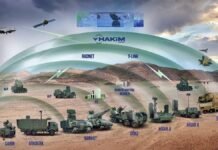
New Delhi: The recent attack on a defense company near Turkey’s capital, Ankara, has drawn new attention to longstanding tensions between Turkey and Kurdish groups. Identified among the assailants is Mine Sevjin Alcicek, a former member of the pro-Kurdish Peoples’ Democratic Party (HDP), a political faction often viewed with suspicion by Turkish authorities. Alcicek, along with Ali Orek, was named by Turkey’s Interior Minister Ali Yerlikaya as a member of the Kurdistan Workers’ Party (PKK), an organization Turkey deems a terrorist entity.
Deadly Attack Unfolds in Ankara:
The incident unfolded on Tuesday when two armed assailants, a man and a woman, stormed the premises of TUSAS a major defense industry complex on the outskirts of Ankara. The duo commandeered a taxi after killing its driver and approached the TUSAS facility with assault rifles, explosives, and a deadly determination. They detonated explosives and opened fire, leading to a fierce shootout that left five dead and more than 20 injured before Turkish security forces neutralized both attackers.
The PKK’s Legacy:
The PKK’s decades-long conflict with Turkey has resulted in an estimated tens of thousands of casualties. Seeking autonomy in Turkey’s Kurdish-majority southeast, the group, led by Abdullah Öcalan, began its campaign in the 1980s with aspirations for an independent Kurdish state. The 1990s marked the conflict’s peak, with thousands of villages destroyed and waves of Kurdish citizens displaced, especially in southeastern Turkey. Today, the PKK is regarded as a terrorist organization by Turkey and its allies in the West.
Turkey Responds with Escalation:
Following the attack, Turkish forces launched intense aerial and ground operations in northern Syria and northern Iraq. On Thursday, Syria’s war monitors reported that Turkish drone strikes had claimed the lives of 27 civilians over a 24-hour period, targeting critical infrastructure, including power and gas stations, as well as oil facilities. In total, 45 drone strikes and four air strikes by fighter jets were recorded, according to the monitors.
Kurdish Targets ‘Destroyed’:
The Turkish Defense Ministry confirmed it had conducted an air operation, destroying 32 PKK-linked targets across Iraq and Syria. Turkey’s strikes hit various Kurdish installations, including bakeries, power stations, and oil depots, in addition to checkpoints held by the Syrian Democratic Forces (SDF). The SDF, dominated by the Kurdish People’s Protection Units (YPG), has long been an ally to the U.S.-led coalition against the Islamic State (ISIS) but remains a target for Turkey, which sees the YPG as an extension of the PKK.

The situation remains tense as Turkey’s ground forces, supported by allied rebel factions, continue their push in northern Syria an area Turkish troops have intermittently controlled since 2016 through a series of cross-border offensives aimed primarily at the SDF. These offensives mark Turkey’s continued stance against what it considers an existential threat along its borders, intensifying a conflict that shows little sign of abating.






















































